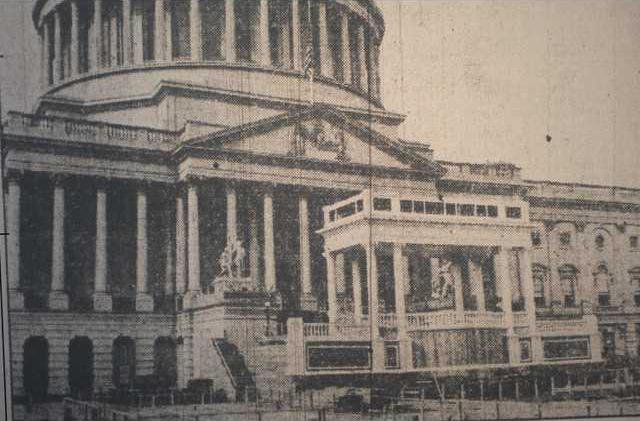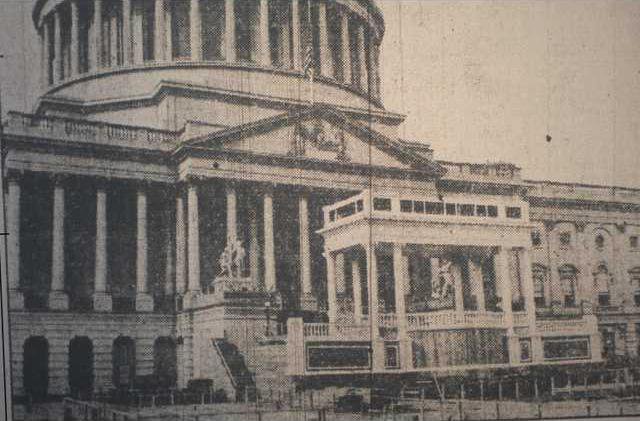Each week we’ll take a step back into the history of Great Bend through the eyes of reporters past. We’ll reacquaint you with what went into creating the Great Bend of today, and do our best to update you on what “the rest of the story” turned out to be.
The first week of March, 1933, marked the beginning of the nation’s recovery from the Great Depression, though it would be years before many would feel real relief. This is the week Franklin D. Roosevelt was inaugurated, which readers of the Great Bend Tribune followed with stories about the President Elect, his wife, Eleanor, the parties and parades planned for the day, and the guest list. On March 4, U.S. President Roosevelt gave his inauguration speech in which he said “We have nothing to fear, but fear itself.”
Roosevelt would hit the ground running the next day, March 5, ordering a four-day bank holiday in order to stop large amounts of money from being withdrawn from banks. The same day, in Germany, the Nazi Party won 44 percent of the vote in German parliamentary elections, though this was but a blip on the radar of Tribune readers. They were more concerned about being able to make withdrawals of their savings. For the past month, all around the country there had been several runs on banks, with depositors removing and hoarding their cash in fear they would lose everything if their banks failed.
Leading up to March 5, several states had already proclaimed bank holidays, limiting the withdrawals of deposits from banks, according to the Tribune. While some states, like Mississippi, only restricted withdrawals, other states, like Louisiana, declared a “cessation until the end of the week of all public business including banks and other public enterprises.”
Kansas Governor Alf. Landon held out, refusing to call a holiday.
“I have been urged,” the governor told reporters, “to declare a holiday, but I am not going to do it.”
However, he did comply with an order directing all state and national banks and trust companies to restrict withdrawals on all classes of deposits to five percent of their totals, effective (March 4, 1933) and until further notice, according to a quote in the Tribune that day.
“Our action yesterday was predicated on information as to anticipated developments in New York, Illinois and Missouri. The results during the night justified our action. There is not a thing basically wrong in Kansas. When other states put their houses in order, we shall be able to resume normal operations here.
“It is my opinion we have reached a crisis today and that we will start convalescing.”
The following week, the country would experience their first fireside chat from the President. On March 9, the U.S. Congress began its 100 days of enacting New Deal legislation, and FDIC insurance was born. Roosevelt promised the American people that only sound banks would be allowed to reopen, and he said, “I can assure you that it is safer to keep your money in a reopened bank than under the mattress.” When the bank holiday lifted on March 13, people stood in line to deposit their money back into their neighborhood banks, and the recovery began.
The reaction in Great Bend was calm. In a story, Checks same as Cash, in the March 5, 1933 Tribune, we learn,
“Business as usual,” was the answer of Great Bend businessmen today to the problem presented by the action of the Kansas legislature yesterday...Practically every business institution in town was represented at a meeting held at the Chamber of Commerce today where such details of the new law were presented. The story went on to praise the soundness of Kansas banks, implying again that the action was necessary because of bad management in other states. “E.C. Davis, president of the American State Bank and W.F. Duckwall, president of the Farmers National Bank, stated that the law passed gave the banks no option in the matter.”
The banks voluntarily created new accounts for each depositor, using five percent from their holdings, which they could use until the crisis was over. They also urged the people to treat checks the same as cash for the time being.
Another lasting legacy of the banking holiday period of the Great Depression was the creation of the game Monopoly, which was invented on March 6, 1933. In the absence of real money, Monopoly money at least passed freely along Boardwalk and Park Place.
Out of the Morgue, March 7, 2013
Banks take a holiday in March, 1933, while an Axis power is born





